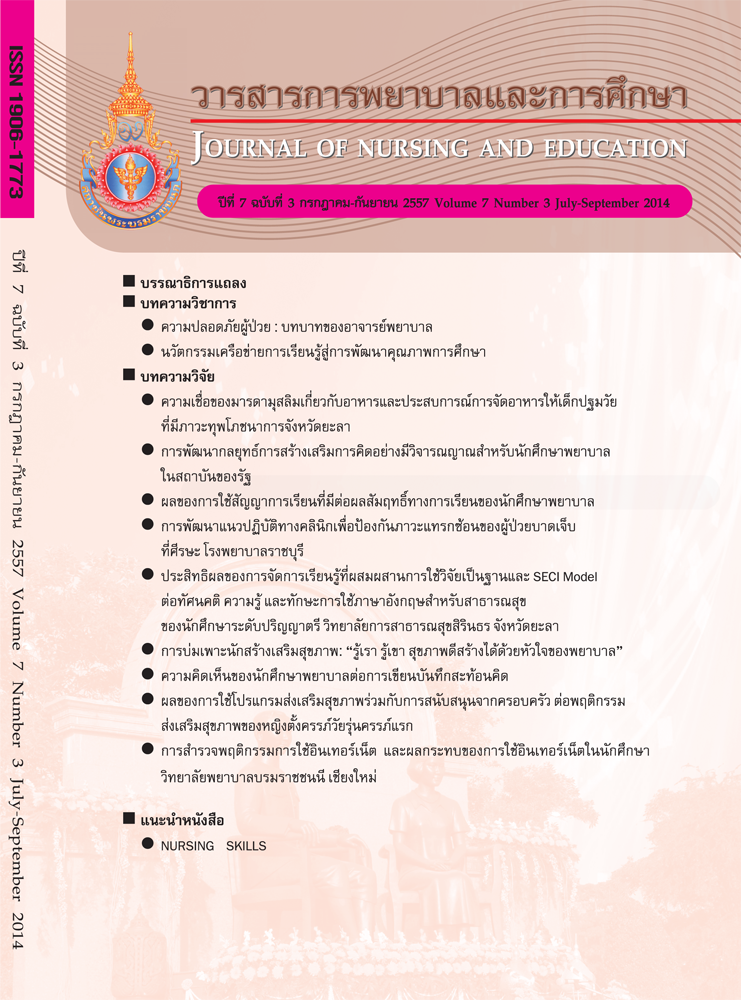การสำรวจพฤติกรรมการใช้อินเทอร์เน็ต และผลกระทบของการใช้ อินเทอร์เน็ตในนักศึกษา วิทยาลัยพยาบาลบรมราชชนนี เชียงใหม่
คำสำคัญ:
การใช้อินเทอร์เน็ต, ผลกระทบ, การเสพติดอินเทอร์เน็ต, Internet utilization, impacts, Internet addictionบทคัดย่อ
บทคัดย่อ
ข้อค้นพบในปัจจุบันระบุว่าผู้ใช้อินเทอร์เน็ตบางรายกลายเป็นผู้เสพติดอินเทอร์เน็ต ส่งผลกระทบต่อการศึกษา การทำงาน สัมพันธภาพกับบุคคลอื่น และสังคมโดยรวม สถานการณ์ปรากฏขึ้นทั่วโลก รวมถึงประเทศไทยที่ซึ่งมีการใช้อินเทอร์เน็ตเพิ่มขึ้นอย่างรวดเร็ว การวิจัยนี้มีวัตถุประสงค์เพื่อ 1) ศึกษาพฤติกรรมการใช้อินเทอร์เน็ต 2) ค้นหาอัตราการเสพติดอินเทอร์เน็ต 3) ศึกษาผลกระทบจากการใช้อินเทอร์เน็ต และ 4) ศึกษาแนวทางป้องกันปัญหาที่เกิดจากการใช้อินเทอร์เน็ตของนักศึกษาวิทยาลัยพยาบาลบรมราชชนนี เชียงใหม่ การเก็บข้อมูลโดยใช้แบบสอบถามออนไลน์ และแบบประเมินการเสพติดอินเทอร์เน็ต (Internet Addiction Scale, IA Scale) กับนักศึกษาของวิทยาลัยพยาบาลบรมราชชนนี เชียงใหม่ จำนวน 426 คน วิเคราะห์ข้อมูลโดยใช้สถิติเชิงพรรณนาและการวิเคราะห์เนื้อหา
การศึกษาพบว่ากลุ่มตัวอย่างส่วนใหญ่ มีเครื่องคอมพิวเตอร์ส่วนตัวและมีการเชื่อมต่ออินเทอร์เน็ต คิดเป็นร้อยละ 82.28 กลุ่มตัวอย่างใช้อินเทอร์เน็ตเฉลี่ย 4.86 ? 3.61 ชั่วโมงต่อวันในวันทำการ และ 7.10 ฑ 4.61 ชั่วโมงต่อวันในวันหยุดเสาร์อาทิตย์ การใช้อินเทอร์เน็ตมากที่สุดสามอันดับแรก คือ เล่นเฟสบุค (Facebook) ฟังเพลง และค้นหาข้อมูลเพื่อการศึกษา (คิดเป็นร้อยละ 100, 94.92 และ 89.06 ตามลำดับ) จากการใช้แบบประเมินการเสพติดอินเทอร์เน็ต (Internet Addiction Scale, IA Scale) พบว่า ร้อยละ 2.34 ของกลุ่มตัวอย่างเป็นผู้ที่มีการเสพติดอินเทอร์เน็ต และร้อยละ 54.30 เป็นผู้ที่ใช้อินเทอร์เน็ตมากเกินไป และมีความเสี่ยงต่อการเสพติดอินเทอร์เน็ต ปัญหาที่พบจากการใช้อินเทอร์เน็ตได้แก่ ปัญหาสุขภาพทางกายและปัญหาสุขภาพจิต ดังนั้นควรมีการส่งเสริมให้ความรู้เกี่ยวกับการใช้อินเทอร์เน็ตอย่างสร้างสรรค์
คำสำคัญ : การใช้อินเทอร์เน็ต ผลกระทบ การเสพติดอินเทอร์เน็ต
ABSTRACT
Empirical studies suggest that some Internet users are becoming addicted to the Internet, causing academic, social and relationship problems. This new emergence appears to be occurring worldwide, including Thailand, where Internet use has increased dramatically. The objectives of this study were 1) to study Internet utilization behaviours and 2) to identify the prevalence of Internet addiction, 3) to study impacts of Internet use of students of Boromarahjonnani College of Nursing, Chiang Mai (BCNC), and 4) to study potential strategies for harm minimization. An online survey and Internet Addiction Scale (IA Scale) were used with 426 students of BCNC. Descriptive statistics were performed on quantitative data. The qualitative data were analyzed using content analysis.
The majority of participants (82.28%) had personal computer with Internet access. The
average time spent on the Internet was 4.86 ? 3.61 hours per day on week day and 7.10 ฑ 4.61 hours per day on weekend. The three most popular activities on the Internet were reported: joining Facebook (100%); listening to music (94.92%); and surfing for school work (89.06%). Using the IA Scale, approximately 2.34 % of participants were classified as addictive Internet users. Moreover, it is
suggested that 54.30% of this population were classified as over users and could be at risk of Internet addiction. School problems and physical and mental health problems were reported as being negative impacts of Internet use. Therefore, an educational program about creative Internet use and harm
minimization, should be promoted.
Keywords : Internet utilization, impacts, Internet addiction






